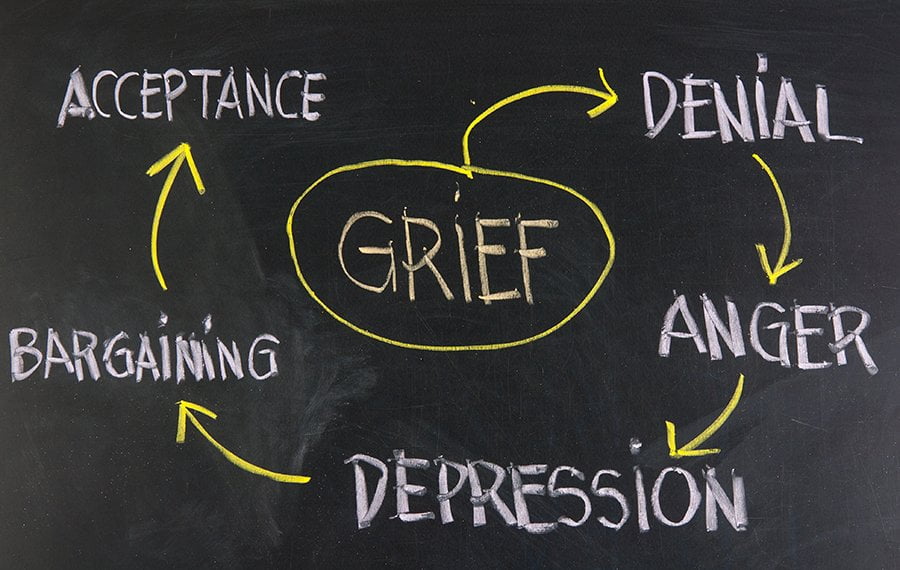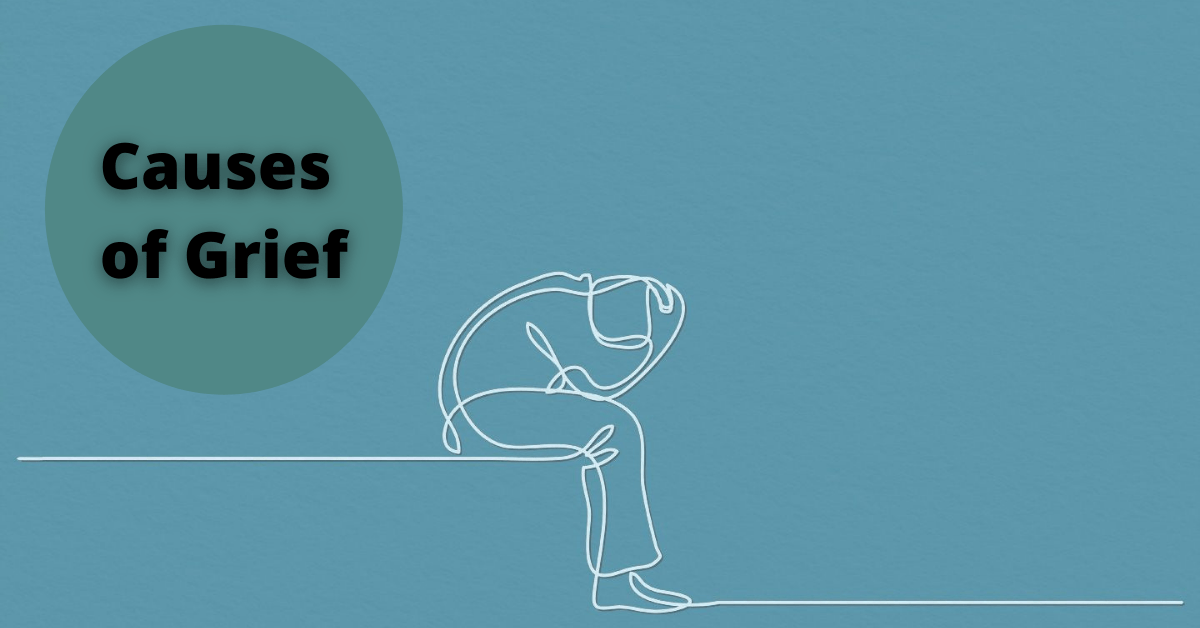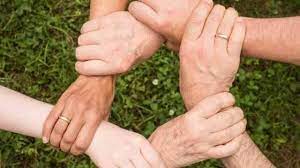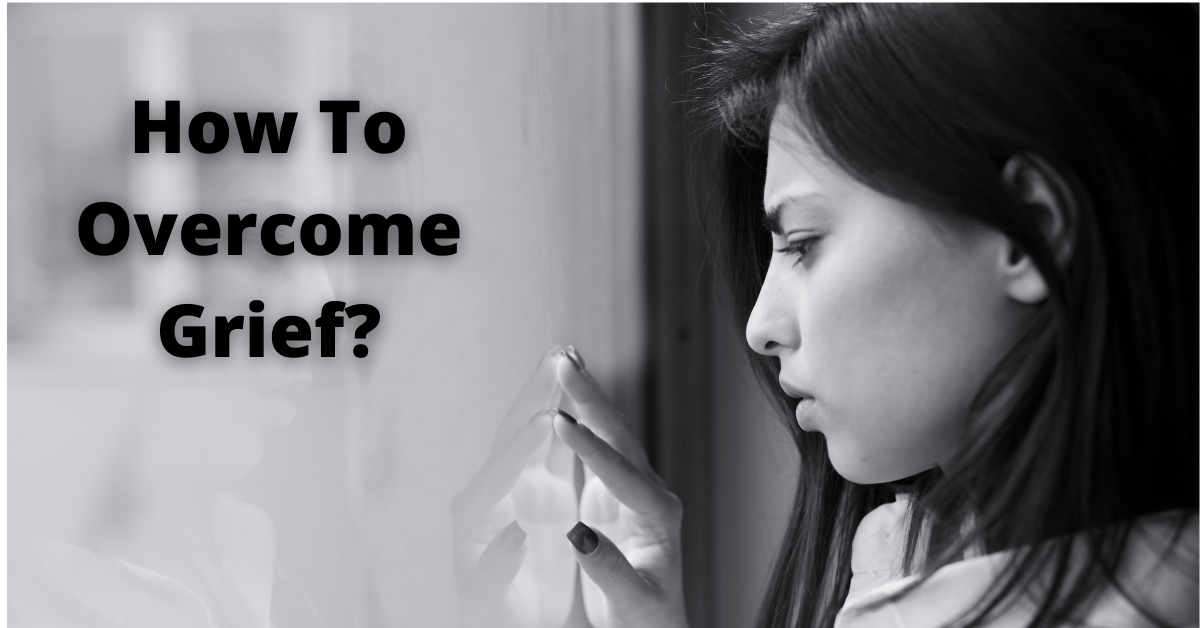Grief is a complicated process that we all go through, but it’s never clear what exactly you’re feeling. Some days you feel like your heart is broken and other days you can’t stop crying for no reason at all. It’s hard to know when the grieving will end and the healing will begin. In this blog post, I’m going to give you some tips on how to make sense of your feelings and help you move forward in life.
Contents
What is Grief?
 Grief is a strong force that can alter a person’s life. This might make them feel much worse than they otherwise could have anticipated. The grieving process may be difficult and lengthy, but afterward, there are numerous possibilities for improvement. These wouldn’t have been feasible without it. The grief can consume you entirely, but eventually, you will emerge on the other side.
Grief is a strong force that can alter a person’s life. This might make them feel much worse than they otherwise could have anticipated. The grieving process may be difficult and lengthy, but afterward, there are numerous possibilities for improvement. These wouldn’t have been feasible without it. The grief can consume you entirely, but eventually, you will emerge on the other side.
People react to loss in different ways. Some people are able to bounce back up right away. Others will need more time to heal and relax. This is before they are ready for the next stage of their life. It’s critical for them to take this break so they know how to proceed with their lives when it’s time for them. Everyone has a unique timetable for recuperation that must be dealt with at their own speed. At some point, everyone emerges better than before.
Different Stages of Grief

Grief is an expected reaction to a loved one’s death. It may be brought on by the death of a family member, the dissolution of a relationship, or even an argument with your spouse. When mourning a loss, people typically experience five distinct stages: shock and denial, rage, bargaining, despair, and acceptance.
The following are examples of the five phases of grief:
Denial
In this stage, individuals might think that the loss is not permanent, and it may take weeks or months for them to comprehend what has occurred. This sense of disbelief can persist for days or weeks after someone passes away or a relationship comes to an end suddenly. People will frequently attempt to come up with methods to return the individual or recall how things are used on their own loved ones. People in this period are frequently isolated since they don’t want to discuss their loss with anybody else. If you’ve never been through anything similar, you can’t really comprehend what they’re going through.
Anger
This is one of the stages of grief. It’s typical for feelings of anger and bitterness toward a loved one to surface after a while has passed since someone dear has died. People may believe it was not fair that they were left alone for so long. Individuals at this age are prone to blame themselves for not spending enough time with the individual who has died. Most people don’t want these unpleasant emotions to linger over them for too long, so after a short while, most people will move on from this phase.
Depression
This is one of the many phases of grief. Depression often follows right after the bargaining period has come to an end. This melancholy mood can linger for weeks or even months following a death or a relationship breakup unexpectedly. People will not want to do much of anything during this time, and they may just sit in bed all day without any desire to get up and go out into the world again until they are ready for it. During these times of sadness, it feels as if everything has been taken away from you, and that nothing matters because the individual who used to be so important to you is gone for good without any possibility of return. They may also feel terrible since they’re still alive when this other person isn’t, making them feel guilty and leading them down a torturous road full of self-hatred and regret.
Bargaining
People often get trapped in the bargaining phase of grief, where they negotiate with God or whatever higher power they believe in for their lost loved one to return. They might bargain by offering to increase their prayer frequency if only this person returns safely and alive again. Even if death isn’t the primary focus of the story, this may still be a time for reflection when someone has lost an important item like an old photo album or keepsake box while moving out of their childhood home. This is another transitory phase that will pass after some time has passed, as most people realize there are no deals to be made for these things, so it’s better to try and move on rather than being stuck on what might have been done differently.
Acceptance
Finally, after their shoulders have been relieved of their sadness, individuals get to the last stage of grieving: acceptance. They realize there’s nothing more they can do other than an attempt to move on with their lives without expecting things to be exactly as they were before because it will never happen again in this phase. They grow to accept what occurred in their life, even if it was extremely distressing at first because this is something that everyone must go through sooner or later in order to grasp why particular events are beyond our control sometimes no matter how much we want them not to be so. Depending on where someone is in their life and how close they were to the person who died or the relationship that terminated, these phases might take anything from days to months.
Symptoms of Grief
There are some symptoms someone may experience when they’re going through grief.
Stress Levels

Someone who is grieving might feel stressed or overwhelmed most of the time because they are not over things yet and it’s still in their mind all throughout each day at times, preventing them from focusing on anything else for a while. It can be without knowing how much that meant to them beforehand. You could find yourself with no appetite whatsoever or you may overeat instead as an alternative reaction to this issue.
Loss of Appetite
When someone is grieving, they may not have much of an appetite for food. They might also overeat instead as a reaction to this issue.
Anxious
This symptom is very common after a loss. It is normal to feel anxious when you are grieving as your mind is trying to process all of the changes that have taken place. You may also feel like you are in danger or that something bad will happen.
Depression
Depression is another very common symptom of grief. You may feel like there is no point in going on or that life isn’t worth living anymore. You may not be interested in activities that used to make you happy and you may feel like crying all the time.
Isolation
Many people who are grieving often feel isolated from their friends and family members. This can be because they don’t want to talk about their feelings or they just don’t feel like being around other people.
Guilt
Many people who are grieving often feel guilty about what they could have done differently or about the things they said to the person who died. You may also feel guilty for feeling happy or enjoying life after the death of your loved one.
Anger
Anger is a very common feeling after a loss. You may be angry at God, yourself, the person who died, or anyone else involved in the situation. You may find it hard to control your anger and lash out at others without warning.
Sleep Issues
 This can either be because you are exhausted from your day and need some rest when it’s time to go to bed each night after work, school, etc., but there are times where the person has trouble falling asleep at all due to thinking about what happened repeatedly in their minds throughout that day no matter how hard they try otherwise.
This can either be because you are exhausted from your day and need some rest when it’s time to go to bed each night after work, school, etc., but there are times where the person has trouble falling asleep at all due to thinking about what happened repeatedly in their minds throughout that day no matter how hard they try otherwise.
Tiredness/Fatigue
Anyone who feels tired often will likely feel fatigued even more so than usual during this situation if they’re already feeling stressed out on top of it.
Digestive Issues
 Someone might have a hard time deciding on what to eat because they don’t feel hungry at all, but then there are also times where you can experience an upset stomach due to being anxious about this situation as well that day in particular.
Someone might have a hard time deciding on what to eat because they don’t feel hungry at all, but then there are also times where you can experience an upset stomach due to being anxious about this situation as well that day in particular.
Causes of Grief

There are some causes of grief people may experience.
Death of Loved One
This is the biggest and most common cause for grief people face in life, where they lose someone very close to them such as their spouse or child unexpectedly.
Loss of Employment/Home
Many people also feel extremely devastated when they suddenly lose their job or home due to circumstances beyond their control that are unavoidable at times no matter how hard you try otherwise. This can make things even harder on yourself if you don’t take time out for yourself during this situation instead, which causes your stress levels to increase more so than ever before too without realizing it until later on down the road after everything happens.
Loss of Pet
Losing a pet is also considered to be a loss and can cause feelings of grief. It is difficult for people who become very attached or close with their pets, especially if the pet dies suddenly like in an accident or from old age.
Unresolved Conflict
This type of situation usually involves unresolved conflict between two people. It can be difficult to cope with the loss of someone you loved if they were angry at you, didn’t like you, or had previously said things that hurt your feelings before their death.
Sudden Illness or Injury
You could suddenly get sick and end up in the hospital, which can be without knowing how much that meant to them beforehand. You might also injure yourself seriously and experience extreme pain during this time if it’s serious enough where you need surgery or something else like physical therapy after getting out to recover from everything properly over time instead of before returning back home again afterward with help at hand for what lies ahead on top of all other things going on within your life at the moment while dealing with it all simultaneously no matter how hard you try otherwise.
Divorce/Breakup of Relationship(s)
Some people also lose their spouse suddenly as well as other relationships such as with friends and family members.
Positive Effects of Grief
There are many benefits of grief. Some of these are:
Gives Emotional Strength
It’s possible for someone to grow stronger emotionally after going through something awful. When confronted with various challenges, later on, this is clearly beneficial.
Helps To Learn About Yourself
 Grief might be a chance for you to figure out who you are. You may find that despite the fact that something terrible occurred, life must go on and it is up to you what happens next. You might grow more mature as a result of your loss. This is due to the fact that you now understand how fragile life is in reality. Every day is more precious than previously because of this. Grieving may also help you develop empathy for individuals who are going through similar problems, allowing you to connect with others and share their burdens instead of attempting to carry them all by yourself as you used on when everything was normal without any issues existing within your mind or heart at any time during daily living.
Grief might be a chance for you to figure out who you are. You may find that despite the fact that something terrible occurred, life must go on and it is up to you what happens next. You might grow more mature as a result of your loss. This is due to the fact that you now understand how fragile life is in reality. Every day is more precious than previously because of this. Grieving may also help you develop empathy for individuals who are going through similar problems, allowing you to connect with others and share their burdens instead of attempting to carry them all by yourself as you used on when everything was normal without any issues existing within your mind or heart at any time during daily living.
Strengthens Bond
 When someone has lost a loved one, their current friends and family become closer because they realize how much the person meant to another person.
When someone has lost a loved one, their current friends and family become closer because they realize how much the person meant to another person.
Helps In Life Decisions
Grieving aids in the development of a more mature mindset because it teaches individuals how quickly their life may change for good if they’re not cautious enough. Some people may choose to pursue their aspirations even faster after experiencing something distressing, such as losing a loved one or breaking up with someone unexpectedly, by learning from these experiences and improving themselves along the way.
Gives Gratefulness
 Someone who is grieving might find themselves being more appreciative of the things in their life that remain. If you’re able to see how much these people meant to you when they were around, there’s no telling what else there is about your own life now. Others might not understand the significance of these kinds of events, but they can make a marked change in your mood. This may have a big impact on whether you feel like nothing is worth it or not. Being thankful for what you have now might help you stay motivated to achieve your objectives and goals in the future.
Someone who is grieving might find themselves being more appreciative of the things in their life that remain. If you’re able to see how much these people meant to you when they were around, there’s no telling what else there is about your own life now. Others might not understand the significance of these kinds of events, but they can make a marked change in your mood. This may have a big impact on whether you feel like nothing is worth it or not. Being thankful for what you have now might help you stay motivated to achieve your objectives and goals in the future.
Disadvantages of Grief
Grief has the potential to have a number of negative consequences for people.
Social Distance
 People would cease discussing ordinary things with their friends and family. These are tasks like working, as well as what they ate for supper last night. Another approach to withdraw is to become emotionally distant from others. It’s without even realizing it until later on when you notice that this occurred. The individual is simply attempting to manage what happened and cope with it at the moment.
People would cease discussing ordinary things with their friends and family. These are tasks like working, as well as what they ate for supper last night. Another approach to withdraw is to become emotionally distant from others. It’s without even realizing it until later on when you notice that this occurred. The individual is simply attempting to manage what happened and cope with it at the moment.
Nightmares
 They may have bad dreams or flashbacks of the events that occurred to them previously. This is due to the fact that it has not yet ended in their minds, and they are constantly thinking about it. It’s until this stage passes from their life one day at a time for good that they will truly be free.
They may have bad dreams or flashbacks of the events that occurred to them previously. This is due to the fact that it has not yet ended in their minds, and they are constantly thinking about it. It’s until this stage passes from their life one day at a time for good that they will truly be free.
Self-Pity
People who are going through grief often wallow in self-pity. This does nothing but make things worse rather than better. When you’re working your hardest to overcome something challenging, this is when it’s important to look within yourself first. It can be without knowing how much that meant to them beforehand.
Abuse
During this time, one of the most prevalent effects on people is drinking or using drugs. For some time, drinking or taking drugs may appear to be an escape. This does not fix your issues; rather, it makes them worse.
Sleep Disorders
 Someone suffering from insomnia will either sleep too much or not at all. The individual may also shed tears through this phase.
Someone suffering from insomnia will either sleep too much or not at all. The individual may also shed tears through this phase.
How To Overcome Grief?

There are a number of ways you can help yourself overcome grief as time passes by instead of letting it drag on and wear you down for the rest of your life like many people do without realizing what has happened to them afterward.
Talk About It
You can always talk to someone about it such as a friend or family member instead of holding everything in and letting things build up until you explode unexpectedly all at once after the right time passes by without doing so.
Get Active/Exercise
You can also get more active and exercise while taking care of yourself properly if needed besides eating your favorite foods again too, which will help you overcome grief faster than not helping yourself through this situation on top of what else is going on within your life that’s happening simultaneously with it happening like many people often do no matter how hard they try otherwise for some unknown reason.
Write It Down
You can even write down your feelings in a journal or on paper instead of keeping them all pent up.
Seek Professional Help
If none of these work out for you, feel free to seek professional help from a therapist to help overcome grief efficiently.
Conclusion
Grief is a difficult topic to talk about, but one that needs more attention. There are many misconceptions surrounding grief and the grieving process in our society which can be damaging for those who experience it firsthand. When you find yourself in this situation, know that there is nothing wrong with feeling whatever emotions come your way- sadness, anger, fear, or confusion. It’s important to remember that all of these feelings are natural responses when someone has lost something they loved dearly so don’t feel ashamed if your tears won’t stop flowing. Seek out support from friends and family members as well as professional sources like therapists when possible because this will help immensely on the road to recovery.
For more information, please contact MantraCare. Grief is a natural and complex emotional response to loss or change. If you have any queries regarding Online Grief Counseling experienced therapists at MantraCare can help: Book a trial therapy session


